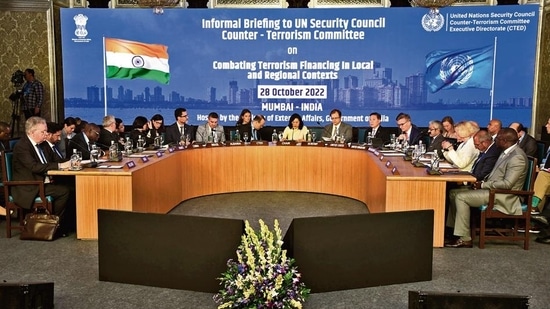
The UN Security Council held a Special Meeting of its Counter Terrorism Committee in India on October 28/29. India, as a target of cross border terrorism since the mid-1980s, has worked hard all these years to mobilise support for action against terrorism by the international community.
In 1986 India proposed a draft document on a Comprehensive Convention on International Terrorism (CCIT) at the UN which would criminalise all forms of international terrorism and deny terrorists, their financiers and supporters access to funds, arms and safe havens. While in many of our joint statements with partner countries the CCIT is supported, including by the US, there has been no concrete progress in the last 46 years. A lack of consensus on a definition of terrorism has proved a hurdle, with some countries, particularly Arab, wanting to exclude national liberation struggles and include state terrorism, keeping in mind the Israel-Palestine conflict.
Since then, the views of the Gulf countries on terrorism have evolved and some support the CCIT. Our own relations with them have become close, the Palestinian issue has lost centrality in their policies and their acceptance of Israel has been a dramatic development. We have good counter-terrorism cooperation with UAE and Saudi Arabia at the bilateral level. The rise of the Islamic State and the perceived threat from the Muslim Brotherhood to the major Gulf states, not to mention terrorist attacks on their oil infrastructure from Yemen attributed to Iranian support, explain their changed thinking.
Any collective action by the international community on terrorism can develop only if it is seen that the combat against terrorism is not vitiated by power politics and geopolitics. The manner in which the war on terror was launched and where it stands today has divided international opinion.
The war on Iraq that overthrew Saddam Hussein triggered years of domestic terrorism. In Syria terrorism has been used as an instrument of political struggle , with some elements allegedly getting western support for toppling the Assad regime. The emergence of the Islamic State (IS) on parts of Iraqi-Syrian territory was clearly a failure of the war on terror in the region.
Turkey has been reputedly linked to the IS to further its own local geopolitical ends. Russia has suspected a western hand in the rise of the Islamic State to destabilise its presence in Syria and as a potential instrument to foment instability in the northern Caucasus. It alleges a western hand in the emergence of IS elements in Afghanistan, calculated to pressure Russia though Central Asia.
By handing over Afghanistan to the Taliban that has used terror as an instrument to establish its grip progressively on the country and force a US retreat, the US has gone against the logic of its own war against terror. Its failure to sanction Pakistan on terrorism despite the country’s proven record in abetting terrorism not only against India but against the US itself, especially when Pakistan sheltered Osama bin Laden and the Taliban leadership for years, raises questions.
Pakistan has already figured two times on the FATF grey list even when its terrorist linkages were manifest. It has been removed the third time after having taken, ostensibly, the required steps to end money laundering and terror financing. That, given the increased radicalisation of the country, the visible street power of extremists and the inability of the political establishment to deal with that challenge, to believe that the jihadi organisations well integrated with the society at large will fade away and money will not be raised for terrorists in mosques etc is a leap of faith entirely for geopolitical reasons. Iran’s designation as a terrorist state, while sparing Pakistan, and the move in the US Congress to designate Russia as a terrorist state can only impede any international consensus on combating terrorism.
China’s conduct on the terrorism issue suffers also from geopolitics and double standards. It habitually covers up for Pakistan on its links with terrorism, lauds its role in combating it, and has prevented several times Pakistanis being designated as global terrorists by the UN 1267 Committee at India’s initiative, even when China is itself concerned about Uighur “terrorists” obtaining support from Pakistani soil.
India has done well to expose the Counter Terrorism Committee to the 26/11 attacks on local ground in Mumbai, reminding its members to bring to justice the perpetrators of terrorism who remain protected and unpunished, as well as the inability of the UN to act in some cases because of political considerations (read China). Apposite messages were conveyed on the gamut of issues that still need to be addressed: terrorism still gets the necessary financial resources to thrive, UN efforts need to be coordinated with the FATF and the Egmont Group, the Security Council sanctions regime should function transparently and effectively on the listing of terrorist groups etc.
India has underlined that despite UN and other mechanisms the threat of terrorism is expanding, particularly in Asia and Africa, that the misuse of the emerging technologies by non-state actors and “lone wolf attackers” have thrown up new challenges for the governments and regulatory bodies, that the internet and social media platforms have become potent instruments in the toolkit of terrorist groups along with the use of unmanned aerial systems by terrorist groups against strategic infrastructure and commercial assets of countries.
Terror challenges and ways for nations and global bodies to fight it remains a grey area.




